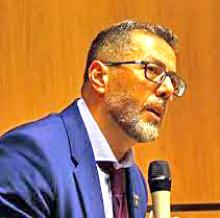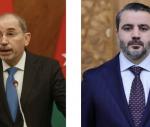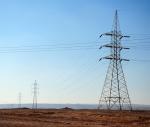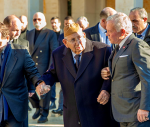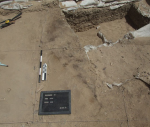You are here
Ghosts of the past: For Israel, war on UNESCO is an existential battle
Sep 26,2023 - Last updated at Sep 26,2023
Jericho does not belong to the Palestinians alone. It belongs to the whole of humanity.
For Israel, however, the recognition by UNESCO of Jericho as a “World Heritage Site in Palestine” complicates its mission of erasing Palestine, physically and figuratively, from existence.
The decision was described by Israel’s foreign ministry as a “cynical” ploy by the Palestinians to politicise UNESCO. This is ironic, as Israel has politicised history by removing anything that could be interpreted as part of Palestinian historical heritage, while elevating a self-centred, and largely fabricated, view of history that supposedly belongs to Israel, and Israel alone.
Though Israel has succeeded, thanks to its massive military power, in dominating the Palestinian physical landscape, it has largely failed in dominating Palestine’s history.
Apartheid walls, military checkpoints and illegal Jewish settlements are easy to construct. Constructing a historical narrative that is dotted with lies, half-truths and omissions, however, is almost impossible to sustain for long.
All of this is part of a protracted Israeli-US war on UNESCO. In 2019, the US and Israel officially withdrew from UNESCO, citing anti-Israel bias. This followed repeated threats by various US administrations, and a cutof funding by the Obama Administration in 2011.
But why such a fierce and determined war against an organisation that describes itself as a promoter of “world peace and security through international cooperation in education, arts, sciences and culture”?
In fact, UNESCO is one of very few UN-linked international institutions that is the least politicised, based on the belief that the past, and whatever remains of it, is a common heritage that belongs to all of us.
As acceptable as such a claim may be for many countries around the world, for Israel UNESCO’s innocuous gestures to the Palestinians are simply heretical.
Not only Jericho, and, specifically, Tell Es-Sultan, belongs in the list of World Heritage Sites, the two should top the list. This is not grandstanding or another ‘cynical’ utilisation of history but simply because Jericho is the “oldest inhabited city in the world” and Tell Es-Sultan is the “oldest town in the world” as it dates back to the 10th millennium BC.
For example, the Pre-Pottery Neolithic Era Tower, circa 8300 BC, is believed, by recent studies, to mark the summer solstice. It was, for nearly 6,000 years, the tallest human-made structure in the world. This is just one of numerous astonishing facts about Tell Es-Sultan.
All of Palestine is rich with such history, which traces our common ancestry to ancient civilisations that have merged or fused into other cultures, giving us the fascinating tapestry that is humanity.
And, because the history of Palestine is the history of humankind, serious Palestinian historians, archeologists and intellectuals rarely display any ethnocentric ownership over that history, thus refusing to claim any ascendency over other cultures.
“All archeological and historical evidence shows that Palestine was inhabited by many people,” wrote respected Palestinian archeologist, Dr. Hamdan Taha, in the recently-published volume “Our Vision for Liberation”.
Palestinian history spans a period starting from the “Homo Sapiens until the 21st century and, over this history, marked by many wars, invasions and conversions, (..) the indigenous population was never completely eliminated,” Taha writes.
A careful reading of Taha’s comments is enough to explain Israel’s fears, bordering on panic, whenever Palestine and the Palestinians are linked to a credible historical narrative.
Two points are worth a pause: one, all the “wars, invasions and conversions” did not succeed in interrupting the demographic flow and continuity of the “indigenous people” of Palestine, culminating in today’s modern Palestinians; and two, those indigenous people, though some invaders have tried in vain, were “never completely eliminated”.
Israel has done more than attempt to rewrite history and to marginalise the main actors of Palestine’s historical narrative. It has also actively and continuously tried to eliminate the natives altogether.
But it failed. The number of Palestinians living in historic Palestine today at least equals, and in someestimates is even higher than the number of Israeli Jewish immigrants from Europe and elsewhere.
Failing at the ‘elimination’ part of history, Israel is now resorting to the two-pronged strategy of ethnic cleansing and racial separation, or apartheid. The latter practice is now increasingly recognized by international human rights groups, including Amnesty, Human Rights Watch, and many others.
The ghosts of the past are another problem facing Israel. A brilliant cadre of Palestinian historians and archeologists, like Taha, joined by courageous and equally brilliant Israeli historians, like Ilan Pappé, are determined to unearth the truth on Palestine’s history and on Israel’s meddling in history.
It is because of such respected individuals, a parallel history to the one invented by Israel following the Nakba has emerged.
Another Tell — the Arabic word for “hill” — aside from Tell Es-Sultan, was recently unearthed. The Israeli newspaper Haaretz said earlier this month that the excavations of Tell Qedesh is “the first-of-its-kind project” uncovering a not so distant past.
In this Palestinian village near the Lebanese border, war crimes were committed, and the hapless villagers, after doing their best to resist Zionist militias, were forced to flee.
To ensure the villagers never return, Israeli authorities bulldozed the village entirely.
“The dig is the first in Israel specifically dedicated to archaeologically exploring the legacy of what Palestinians remember as the Nakba,” Haaretz wrote.
For decades, Palestinians have been doing just that. Several generations of Palestinian archeologists have helped reanimate much of that history, ancient and modern. “The rule of archeology is to reconstruct the past in order to build the future,” according to Taha.
Unlike Israel, however, Taha’s vision aims to “incorporate the voices of all peoples, groups, cultures and religions that have lived on the land of Palestine”.
This inclusive vision is at direct odds with Israel’s exclusivist, selective, and often fabricated “vision”, predicated on military domination and cultural erasure.
In its Extended 45th Session of the World Heritage Committee in Riyadh on September 17, UNESCO has justconfirmed the validity of the Palestinian vision. Naturally, Israel is angry because invaders hate the truth.
Ramzy Baroud is a journalist, author and the Editor of The Palestine Chronicle. He is the author of six books. His latest book, co-edited with Ilan Pappé, is “Our Vision for Liberation: Engaged Palestinian Leaders and Intellectuals Speak Out”. His other books include “My Father was a Freedom Fighter” and “The Last Earth”. Baroud is a Non-resident senior research fellow at the Centre for Islam and Global Affairs (CIGA). His website is www.ramzybaroud.net

